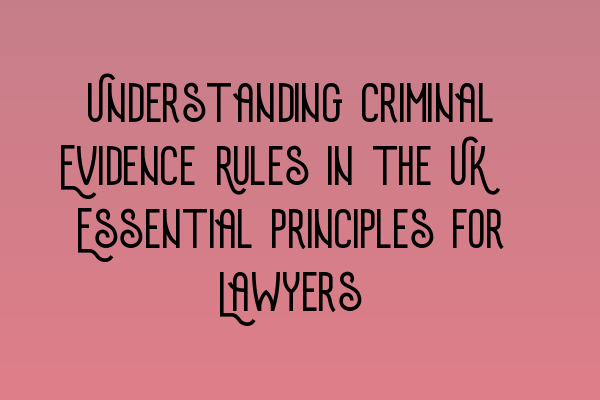Understanding Criminal Evidence Rules in the UK: Essential Principles for Lawyers
As a lawyer practicing criminal law in the UK, it is crucial to have a sound understanding of the rules governing the admissibility of evidence in criminal proceedings. The rules surrounding criminal evidence are designed to ensure fairness, protect the rights of the accused, and uphold the integrity of the criminal justice system. In this article, we will explore the essential principles that every lawyer should be familiar with when it comes to criminal evidence rules in the UK.
1. The Burden and Standard of Proof:
In criminal cases, the burden of proof rests on the prosecution to prove the guilt of the accused beyond a reasonable doubt. This high standard ensures that individuals are not wrongfully convicted and maintains the principle of “innocent until proven guilty.” It is important for lawyers to understand the level of proof required and be able to challenge any evidence that falls short of this standard.
2. Admissibility of Evidence:
Not all evidence is admissible in criminal proceedings. The court will consider various factors when determining the admissibility of evidence, including relevance, reliability, and fairness. Lawyers must have a thorough knowledge of the rules of evidence to effectively challenge any evidence that is improperly admitted or prejudicial to their clients.
3. Hearsay Rule:
The hearsay rule is a fundamental principle in criminal evidence law. It states that out-of-court statements offered for the truth of the matter asserted are generally inadmissible unless they fall within one of the recognized exceptions. Lawyers must be able to identify hearsay evidence and understand the exceptions that may apply in order to effectively present their case or challenge the admissibility of such evidence.
4. Expert Opinion Evidence:
Expert opinion evidence plays a crucial role in many criminal cases. However, the admissibility of expert opinions is subject to certain requirements, including the expert’s qualifications, the reliability of the methodology used, and the relevance of the opinion to the issues in dispute. Lawyers need to carefully assess the admissibility of expert evidence and be prepared to challenge it if necessary.
5. Character Evidence:
Character evidence refers to evidence of a person’s character or disposition that is offered to prove their conduct in a given situation. The general rule in the UK is that character evidence is inadmissible to prove guilt or innocence in criminal proceedings. However, there are exceptions to this rule, such as when the accused’s character is an essential part of their defense. Lawyers must navigate the rules surrounding character evidence to present a compelling case for their clients.
6. Identification Evidence:
Identification evidence is often a crucial component of criminal cases, especially those involving eyewitness testimony. The courts recognize the potential for error in identification evidence and have established guidelines to ensure its reliability. Lawyers must be aware of these guidelines and be prepared to challenge identification evidence that is unreliable or tainted.
7. Corroboration:
Corroboration refers to the requirement of independent evidence that connects the accused to the alleged offense. While not a strict rule in all cases, corroboration is often required for certain types of evidence, such as accomplice testimony. Lawyers need to carefully consider the requirement of corroboration when building their case and ensure that all evidence is properly supported.
In conclusion, understanding the rules governing criminal evidence is essential for lawyers practicing criminal law in the UK. By familiarizing themselves with the principles outlined above, lawyers can effectively present their case, challenge evidence when necessary, and uphold the rights of their clients. Criminal law is a complex field, and staying up-to-date with the latest developments and case law is crucial for success as a criminal lawyer.
For further reading on related topics, check out these articles:
– [SQE Exam Prep: Essential Study Materials for Aspiring Solicitors](https://expert-delawarellc.com/sqe-exam-prep-essential-study-materials-for-aspiring-solicitors/)
– [Demystifying the Solicitors Qualifying Examination Format](https://expert-delawarellc.com/demystifying-the-solicitors-qualifying-examination-format-4/)
– [SQE Exam for International Lawyers: Challenges and Success Strategies](https://expert-delawarellc.com/sqe-exam-for-international-lawyers-challenges-and-success-strategies/)
– [LLC Formation Made Simple: Step-by-Step Guide for UK Entrepreneurs](https://expert-delawarellc.com/llc-formation-made-simple-step-by-step-guide-for-uk-entrepreneurs/)
– [LLC Formation: A Step-by-Step Guide for UK Entrepreneurs](https://expert-delawarellc.com/llc-formation-a-step-by-step-guide-for-uk-entrepreneurs/)
At SQE Criminal Law & Practice Law UK, we provide comprehensive legal services and expert advice in criminal law matters. Contact us today to speak with one of our experienced solicitors and ensure your case is handled with professionalism and expertise.
